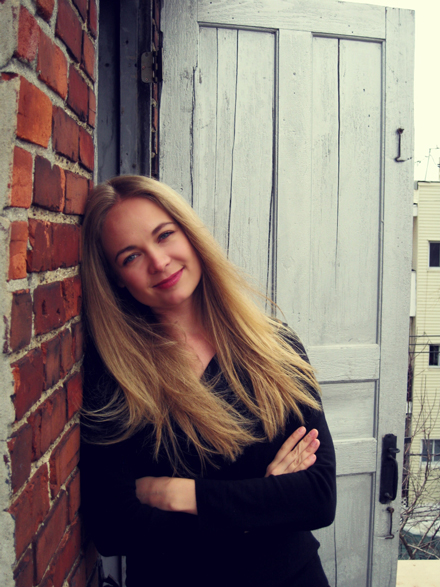
Grad student Xenia Kurguzova wins SSHRC prize for visual depiction of research
By Tamarah Feder
Earlier this year, the Social Sciences and Humanities Research Council (SSHRC) launched Research for a Better Life: The Storytellers, a competition encouraging Canadian post-secondary students to find innovative ways of communicating how funded research projects about people, behaviour, human thought and culture are beneficial to Canadians – and beyond. The SSHRC rules? “Make it creative, compelling and clear.” The prize? $3,000 and the chance to compete for a featured presentation at the next World Social Sciences Forum.
This was a challenge Faculty of Education student Xenia Kurguzova could not resist. As a graduate student at the Faculty’s School of Information Studies, finding ways to manage, simplify and deliver challenging data is what she does. The competition presented an ideal opportunity to draw on a McGill-based research project to showcase a combination of her theoretical education and creativity.
The competition also appealed to Kurguzova because of her focus in digital humanities, which she describes as “interdisciplinary studies that wed social science and humanities with the newest technological tools that allow us to go deeper into research and do, among many things, text mining and data visualization.”
While other competitors chose to represent their own research, Kurguzova chose to make the most of her expertise to benefit someone else. “It made sense to apply my training in translating someone else’s research into a format that could allow someone to immediately take in the subject matter and, perhaps, pique their interest into learning more,” she explained.
She delved into current SSHRC-funded research projects taking place at McGill, and was immediately drawn to the work of political science Professor Maria Popova that examines how the judiciary addresses the prosecution of high-level political corruption in Eastern Europe.
Making funded research relevant to Canadians is an important aspect of the competition. “It’s interesting to examine our perceptions of corruption when it happens elsewhere, but it’s taking place right here – in Quebec. The challenge for me was to make a link between how these seemingly ephemeral projects are beneficial to us all. This is taxpayer’s money, so I wanted to show how Professor Popova’s work ties in to Quebec and Canada,” said Kurzugova.
From Popova’s perspective, learning how political corruption gets prosecuted in Eastern Europe is “extremely relevant for Quebec – and elsewhere. The theoretical conclusions drawn in my research will help us have a better grasp of the conditions under which the judiciary works to curb corruption – or avoids tackling it.”
She makes the case that we could learn a lesson from a region comprised of so-called new democracies, arguing “More may be going on to address political corruption in Eastern Europe than right here in Quebec.”
In addition to the challenge of identifying the research project she wanted to convey, Kurzugova has to quickly absorb the material well enough to condense it into a visual representation. That required her to take on a self-taught crash course on locating and learning open source info-graphic software. She also had to meet the strict requirements of communicating thousands of words and hours of research into no more than 300 well-placed, visually appealing words that get to the heart of the matter, without “dumbing down” the subject matter.
Entering unchartered territory and finding her way quickly is not new to Kurguzova, who came on her own to Canada from Russia just 11 years ago.

Landing in Trois-Rivières, she learned French by immersing herself into life there and earning a Bachelor’s in Quebec History followed by a Master’s in History, before coming to McGill for her second Master’s, this time in Library and Information Studies.
That desire to understand the complicated has been paying off. Kurguzova’s final – and winning – entry in the SSHRC competition is a concise series of easy-to-follow images and carefully chosen words that draw the viewer into Popova’s research and its value, long-term goals, and the beneficiaries.
Popova appreciates incorporating a visual approach in relaying complex research to lay and academic audiences, “It’s a very useful medium, and it’s probably the future of how we will be presenting a lot of our research in the social sciences. It can be even more helpful once I have concrete results.”
But in the meantime, she’s keen to put Kurguzova’s info-graphic to immediate use by using it to recruit research assistants and posting it to the research project’s public website so that anyone can learn more about the research.
Kurguzova heads to Victoria this summer to present her work with the other winners from across Canada, and to compete for a chance to address an international audience of social science academics this October in Montreal. So, from now until then, she’s focusing on her presentation skills. However things turn out over the next while, Kurguzova feels she has come out on top by taking on a tough task in short time, and learning an invaluable amount that will serve her longer-term academic goals.
